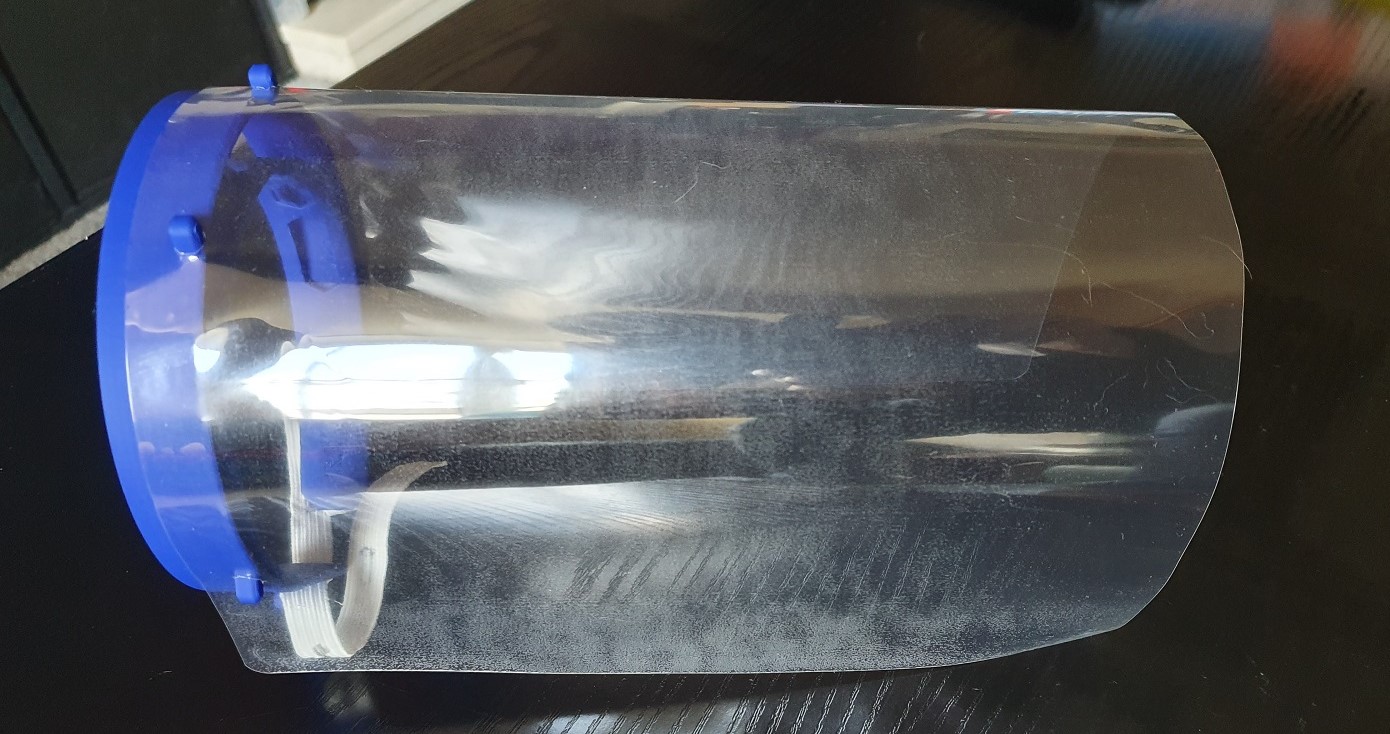Aberystwyth University provides protection equipment to NHS during COVID19 crisis

One of the face shields that have been produced using 3D printing technology by staff at Aberystwyth University.
01 April 2020
Aberystwyth University departments are helping healthcare professionals to stay safe as the number of patients infected with Coronavirus continues to rise.
Staff at the University are producing and donating personal protective equipment (PPE) to staff at local healthcare facilities.
A team from the Department of Geography and Earth Sciences has taken all their supplies of PPE to the local district general hospital in Aberystwyth, Ysbyty Bronglais, while colleagues in the Faculty of Business and Physical Sciences are producing protective headgear and donating it to front-line health workers.
Intelligent Robotics expert Dr Patricia Shaw and Outreach Officer Natalie Roberts are using 3D printing technology to manufacture face shields which they are providing free of charge to community carers, a local doctor’s surgery and a specialist healthcare charity group.
Working from home, Patricia and Natalie are printing the headband before attaching a screen and an elastic adjustable strap which is provided by local donors.
Printed and assembled, the shields protect the face against larger fluid particles and act as a barrier to stop hand to face contact.
Based on a design created by a 3D printer company, their effort is part of a wider movement by the 3D printing community across the UK to provide equipment to healthcare providers at a time of great need.
Natalie Roberts said: “The first request was made to the Department of Computer Science, by which point we were already in lock-down and working from home. Thankfully the departmental contact knew that we had a well-tuned working 3D printer so referred the request to us. We then advertised on our local Covid-19 community WhatsApp group to see if there was anyone else who would benefit. This got us in contact with a staff member from specialist healthcare charity who asked what we could provide, and a local GP practice.”
The detailed nature of the work means they can produce three headband pieces each day. Six face shields have already been delivered, with the finished items collected from a sterilised food container outside their home.
Natalie Roberts added: “We are just glad to have found a way of helping others during these difficult times. If any other local 3D printer owners can lend a hand, we’d be very keen for them to get in touch, because, at this rate, we’ll need more capacity very soon.”
As well as providing much needed protection, the headbands are also environmentally friendly as they are made from PLA, a type of plastic which is both biodegradable and recyclable.
Once the coronavirus pandemic has subsided, Natalie is looking forward to resuming her outreach work and incorporating workshops on 3D design and printing as more and more schools invest in the technology.
Meanwhile, the head of the Department of Geography and Earth Sciences, Dr Sarah Davies was part of a team who ferried the PPE to Ysbyty Bronglais – donating their entire stock to front-line workers.
Dr Davies said: “We’re seeing stories in the media on a daily basis about how our healthcare professionals and those working in social care are really putting their own personal safety to one side in order to help those in most need in these desperate circumstances. We cannot thank them enough of course, but if our stocks of equipment can help them in any small way, we’re more than happy to hand them over.”



